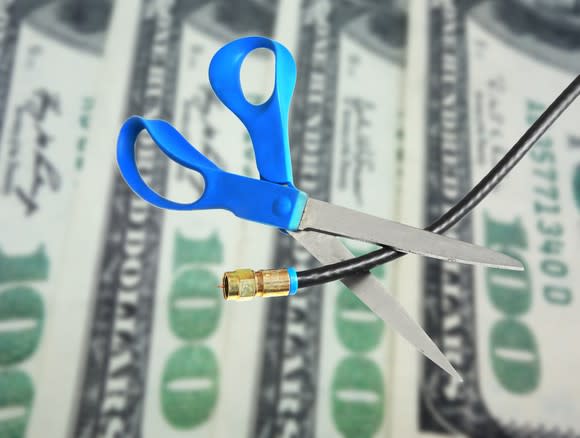Where Does Hulu Go From Here?
When Walt Disney (NYSE: DIS), 21st Century Fox (NASDAQ: FOXA), Comcast's (NASDAQ: CMCSA) NBCUniversal, and AT&T (NYSE: T) came together to launch Hulu, it was the first streaming video on demand (SVOD) service to seriously challenge Netflix, the service that essentially invented the business space. But more than a decade later, Hulu's future is in question.
Disney's 21st Century Fox deal and a new threat to Hulu
Disney's acquisition of 21st Century Fox turned it into the majority owner of Hulu, of which it now owns 60%. Comcast owns 30% through NBCUniversal, and AT&T owns 10%.
But Disney's acquisition of 21st Century Fox also gave it the stable of media properties it needed to launch an attack on Netflix. Disney is set to release a new SVOD streaming service, Disney+, in 2019. That service will compete with Netflix -- and, clearly, with Hulu as well.

Image source: Getty Images.
Disney+ will feature content from Disney and 21st Century Fox studios. That's no surprise: the model for maximizing profits in the streaming business right now is to produce as much content as possible with in-house studios. Disney's best bet for profits is to create fully owned content through fully owned studios for use on its fully owned streaming platform. But that leaves Hulu, a joint venture, without the inside track to Disney content.
Comcast, AT&T, and the future of Hulu
It's not hard to see why Disney would prefer to license its own content to its fully owned streaming service rather than to its partly owned one. Hulu will have to accept this and rely on other sources for licensed content. Turning to its other parent companies would make sense.
But how eager will Comcast and AT&T be to license content produced by their studios to Hulu? Comcast was an equal partner in Hulu back when Disney and 21st Century Fox were separate entities that each held 30%. Now any deal between Comcast-owned studios and Hulu would disproportionately help Disney, even as Disney hurts Hulu by investing heavily in SVOD competition.
Hulu with Live TV and other complications
The aforementioned considerations are only the SVOD side of the equation. Hulu has a skinny bundle live TV service, too: Hulu with Live TV. Though subscriber numbers are smaller for the skinny bundle side of Hulu's business -- a bit over 800,000 of Hulu's more than 20 million subscribers have Hulu with Live TV -- the skinny bundle may be a larger factor in the future. In fact, it may already be: while above numbers represent the most recent official announcement, Hulu CEO Randy Freer has bragged about subscriber growth in terms that suggest Hulu will reach 23 million subscribers by the end of this year -- and that that growth is being fueled by Hulu with Live TV's gains, which may have been as high as 500,000 subscribers in Q3.
This leads to more complexities. Skinny bundles are not very profitable right now. Hulu co-owner AT&T has a competing skinny bundle, DirecTV Now, which has 1.86 million subscribers to Hulu with Live TV's 800,000 -- though that very significant gap may be closing if Hulu with Live TV is really growing as fast as Freer's comments imply. And the future of live TV itself may have some surprises in store: one of the biggest threats to the future of live TV is the possibility of a sports exodus, a threat that is brought into sharper relief by perennial speculation about Disney-owned ESPN's direct-to-consumer potential.
What will Hulu do?
Hulu is in a bad spot. And it is arguably an undeserved position; Hulu was on the upswing in 2017 (it added 5 million users and won two Golden Globes) and passed 20 million users in 2018. These wins suggest that Hulu should have a bright future, despite lagging in subscriber count behind Netflix.
The recent success of Hulu means Disney isn't likely to close it down. A sale to Comcast seems more logical: it would give Disney cash for its superfluous streaming service while giving Comcast a service to combine with its studios into a Disney- and Netflix-like cocktail. But Disney seems content to hold on to Hulu for now -- perhaps because Disney+ is arriving so soon. Surely Disney would not mind waiting until Disney+ is up and running before selling Hulu to Comcast and creating an external competitor. On the other hand, Hulu's value may be lower in 2019, seeing as three new SVOD services -- Disney+, AT&T's new WarnerMedia service, and Apple's as-yet-unnamed service -- are scheduled to add to the service's competition that year.
Hulu's future
Only one thing is clear: things can't last too long the way they are. Disney seems unlikely to split its content between two services in the way some observers have suggested. (The idea that Hulu could be for Disney's "edgier" content suggests a kid-stuff vibe that Disney+'s massive scale belies; Disney+ is virtually certain to be for everyone in the same way that Netflix and Hulu are.) An eventual sale of Hulu seems like the most likely future, but Hulu will have trouble cutting content deals until that point. Right now, Hulu's future holds a lot more questions than answers.
More From The Motley Fool
Stephen Lovely owns shares of Apple, AT&T, and Netflix. The Motley Fool owns shares of and recommends Apple, Netflix, and Walt Disney. The Motley Fool has the following options: long January 2020 $150 calls on Apple and short January 2020 $155 calls on Apple. The Motley Fool recommends Comcast. The Motley Fool has a disclosure policy.

 Yahoo Finance
Yahoo Finance 